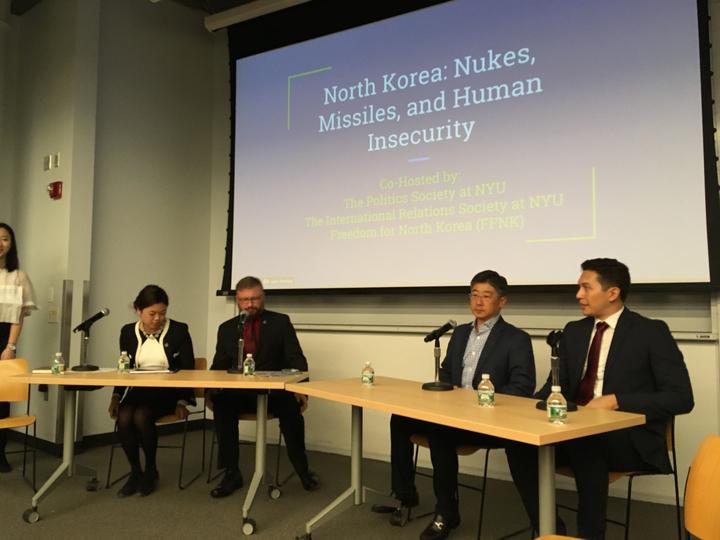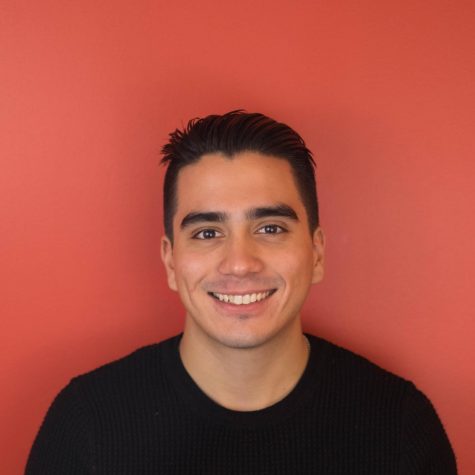NYU Panel Discusses Human Rights Violation and Growing Escalation in North Korea
Monday’s “North Korea, Nukes, Missiles and Human Insecurity” was hosted by NYU Freedom for North Korea, the NYU Politics Society and the International Relations Society. Representatives from each group discussed the possibility of a united Korean peninsula and the likelihood of nuclear war between the United States and North Korea.
October 24, 2017
Amid escalating tensions between the United States and North Korea, international affairs experts discussed policy solutions at a panel on humans rights violations, the effects of American military intervention and the possibility of a united Korean peninsula. Over 50 students attended “North Korea, Nukes, Missiles and Human Insecurity” on Monday, Oct. 23.
This panel discussion, co-hosted by NYU Freedom for North Korea, the NYU Politics Society and the International Relations Society at NYU, comes after a continuous series of missile tests conducted by the North Korean government. The most recent missile launch passed over Japanese airspace, forcing Tokyo citizens to seek shelter.
Despite President Donald Trump’s threat in August to respond to North Korean aggression with “fire and fury,” panel member and Executive Director of the Committee for Human Rights in North Korea Greg Scarlatoiu assured audience members that a full-scale war remains unlikely.
“The likelihood of a war is close to zero,” Scarlatoiu said. “Our greatest enemy is miscalculation.”
While the other three panel members echoed Scarlatoiu’s dismissal of an imminent conflict, Rosa Park, the director of programs for the HRNK, said that if the North Korean government were to attack any American ally, the United States would be obligated to intervene.
Jeff Choh, the director of the Pyongyang University of Science and Technology, urged future scholars and journalists in attendance to spend more time considering the North Korean people’s perspective amid heating tensions.
Henri Féron, a postdoctoral research scholar at Columbia Law, spoke about his experience living with North Korean refugees residing in South Korea. Each speaker involved had a direct connection to or had spent significant time in North Korea. Both Park and Féron discussed how the Korean War displaced members of their own families.
Scarlatoiu, a Romanian native, said that the North Korean regime reminded him of his home country under Soviet occupation. Scarlatoiu told the audience that his commitment to protecting human rights in North Korea was his way of seeking personal closure for not getting involved in Romania as a young adult.
Choh, who was born in South Korea and attended college in the United States, said he felt an obligation to provide his perspective to North Korean students after realizing that the majority of outside educators in the region were of white American origin.
The event, which lasted four hours and featured an extensive question and answer section, was the biggest event of the year for the organizations involved, according to club members.
Grace Moon, the president of NYU Freedom for North Korea, said recent events under the Trump administration have shifted the club’s focus from awareness to activism.
“After the rising political tensions under the Trump administration we really shifted our organization’s focus,” Moon said. “We wanted to shift our focus to be more political and more direct. We want to get students directly involved.”
Correction: Oct. 29, 2017.
A previous version of this article incorrectly stated Henri Féron’s name as Henry Féron. In addition, the article said that Féron lived with North Korean citizens, while he actually lived with North Korean refugees residing in South Korea. Finally, Jeff Choh’s last name was incorrectly referenced as “Chou” at one point in the article. All errors have since been fixed.
Email Mack DeGeurin at [email protected].













































































































































